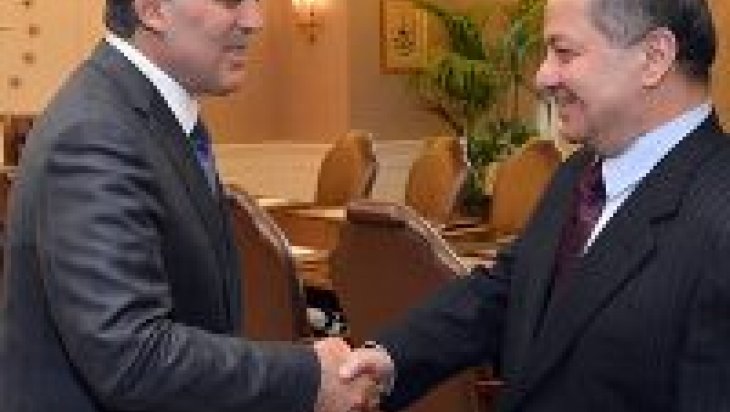The KRG President Masoud Barzani’s Visit to Turkey

While Iraq has been going through a highly critical process, the President of the Kurdistan Regional Government (KRG) Masoud Barzani paid a visit to Ankara and held talks with the Prime Minister Recep Tayyip Erdoğan, the President Abdullah Gül and the Minister of Foreign Affairs Ahmet Davutoğlu. During the meetings, the operations of ISIS (The Islamic State of Iraq and al-Sham), the KRG’s discourse of independence, bilateral energy relations, the relations between Turkey and Iraq and the political process in Iraq wereat the top of the agenda. The fact that the balances in the north of Iraq have changed after ISIS’s operations makes the visit much more crucial for both the KRG and Turkey. The KRG began to seize the regions that Iraqi Central Government had withdrawn. Especially after the peshmergasseized Kirkuk, Masoud Barzani announced that they would not withdraw from the peshmarge-dominated regions and even a referendum for independence would be held in these regions, which led to a political showdown between Iraqi Prime Minister Nouri Al-Maliki and Masoud Barzani. Although Nouri Al-Maliki has not been successful against the ISIS’s operations yet, he threatened the KRG with his claims that Erbil had become "a haven for the terrorists" and the peshmergas would be caught where they took shelter. In response, Masoud Barzani called on the Kurdish ministers to withdraw from the government while Nouri Al-Maliki discharged Hoshyar Zebari from his postas Foreign Minister. In such an atmosphere, Masoud Barzani's visit to Turkey could be assessed as an attempt to reassure Turkey's support. Besides, Masoud Barzani could be trying to foresee Turkey's reactions toward his discourse of "independence". Yet, Turkey still stood by Iraq's territorial integrity and political unity. According to the press accounts, Turkey gave messages to Barzani with regards to “supporting the political process in Iraq and taking protective steps for Iraq's integrity.” Turkey is aware of the negative effects of a potential division of Iraq for both Iraq and the Middle East. It is obvious that the division of Iraq cannot remain limited to Iraq's borders. Therefore, it could be said that Barzani did not get the answer he had expected. However, the relations between Turkey and the KRG are expected to sustain stability depending on the KRG’s attitude. The parties are likely to preserve the relations regarding especially energy cooperation and trade. As a result of particularly ISIS’s operations, the problem of merchandise supplies could be solved over the nearest country, Turkey. The problem of fuel oil in Iraq is at the highest level and the prices, therefore, increase by approximately 100 per cent. To compensate the problem, Turkey has begun to transmit refined oil.
The KRG’s uneasiness about the security probably came to forefront during the meetings. Among the Kurdish delegation accompanying Barzani, there were Peshmarge Minister Mustafa Saeed Qadir, Secretary General of Peshmarge Minister Cabbar Yaver, Interior Minister Karim Sinjari, the Chief of Staff to the Presidency of the KRG Fuad Hussein. The participation of the senior security officers reflects the dimension of the KRG’s concerns about the security. Therefore, it is highly probable that the KRG is disturbed by the ISIS’s activities in Iraq though the peshmarges and the ISIS militants have not faced off, except for Celevle. New dynamics of conflict could emerge between the KRG and ISIS as a result of ISIS’s heading for the regions controlled by the KRG after the withdrawal of the Iraqi Central Government. Besides, the border security and Syrian crisis create a security threat for both Turkey and the KRG. Therefore, the possibilities for the security cooperation may have been discussed within the scope of the visit.
It is significant that Barzani visited Turkey just after the six-article Kurdish reform package was ratified in Turkey. The participation of Turkish Interior Minister Efkan Ala to the meetings held between Barzani, the Prime Minister Erdogan and the Minister of Foreign Affairs Ahmet Davutoğlu signals that the legal activities conducted for the terrorist organization PKK during the peace process was on the agenda of the meetings.
In conclusion, it is possible to think that the issues such as the threat posed by ISIS’s operations in Iraq to Turkey and the KRG, the continuity of the relations between Turkey and the KRG, Iraq’s territorial integrity and political unity, the possibilities of a cooperation between Turkey and the KRG about Syria and the terrorist organization PKK, the position of the KRG in Iraq constituted the topics of mutual interests during Masoud Barzani’s visit to Turkey. All these issues create trouble for the KRG more than Turkey. Therefore, if the KRG expects Turkey’s support, it should pay attention to Turkey’s priorities. In 2009-10, the KRG had strained its relations with all the groups in Iraq’s domestic politics and this created a political atmosphere in which the Sunnis and Shiites showed a common reaction maybe for the first time in Iraq’s history. During that process, Turkey’s making an expansion in its relations with the KRG comforted the KRG. The current conditions, though Iraqi Kurds seem more advantageous in comparison with the other groups, may reverse depending on the developments in Iraq resulting in the KRG’s losing its advantageous position. When the discouraging attitudes of the USA and Iran for the KRG’s existing politics are taken into consideration, it is possible to state that Turkey’s support is not solely enough for the KRG.










